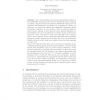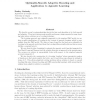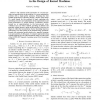65 search results - page 2 / 13 » A bound on the label complexity of agnostic active learning |
CC
2010
Springer
13 years 2 months ago
2010
Springer
We prove that the concept class of disjunctions cannot be pointwise approximated by linear combinations of any small set of arbitrary real-valued functions. That is, suppose that t...
COLT
2007
Springer
13 years 10 months ago
2007
Springer
We prove that the concept class of disjunctions cannot be pointwise approximated by linear combinations of any small set of arbitrary real-valued functions. That is, suppose there ...
ALT
2006
Springer
14 years 1 months ago
2006
Springer
Most of the existing active learning algorithms are based on the realizability assumption: The learner’s hypothesis class is assumed to contain a target function that perfectly c...
ALT
2002
Springer
14 years 1 months ago
2002
Springer
We describe a new boosting algorithm that is the first such algorithm to be both smooth and adaptive. These two features make possible performance improvements for many learning ...
IJCNN
2007
IEEE
13 years 11 months ago
2007
IEEE
Abstract— The optimal model parameters of a kernel machine are typically given by the solution of a convex optimisation problem with a single global optimum. Obtaining the best p...



